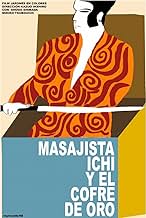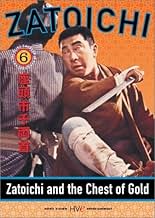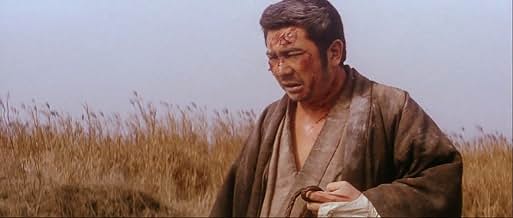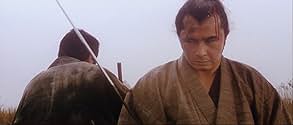IMDb RATING
7.3/10
1.9K
YOUR RATING
Zatoichi is mistaken for a thief. To clear his name he must find and defeat the real villain.Zatoichi is mistaken for a thief. To clear his name he must find and defeat the real villain.Zatoichi is mistaken for a thief. To clear his name he must find and defeat the real villain.
- Director
- Writers
- Stars
Tomisaburô Wakayama
- Jûshirô
- (as Jo Kenzaburo)
Kenjirô Uemura
- Gundayu Matsui
- (uncredited)
- Director
- Writers
- All cast & crew
- Production, box office & more at IMDbPro
Featured reviews
The Zatoichi series take a huge jump upward with this entry. Everything also falls into line -- you can tell people in front of and behind the camera had really hit their stride.
This film offers more action that the previous entries, as well as stunning cinematography and gorgeous production values. Another bonus -- the appearance of Katsu Shintaro's real-life older brother, Wakayama Tomisaburo. It's as if the box office performance of the previous films justified bringing out the big guns this time.
If you're new to Zatoichi and wondering with which film to take the plunge, then "Chest of Gold" is definitely worth your time.
This film offers more action that the previous entries, as well as stunning cinematography and gorgeous production values. Another bonus -- the appearance of Katsu Shintaro's real-life older brother, Wakayama Tomisaburo. It's as if the box office performance of the previous films justified bringing out the big guns this time.
If you're new to Zatoichi and wondering with which film to take the plunge, then "Chest of Gold" is definitely worth your time.
This film sure started off well. Instead of the usual credits, these were the coolest ones yet. Against a black background, Zatôichi smokes a cigarette as periodically evil men attack him and he dispatches them like flies--and continues smoking like he's the toughest guy in town!
When the film itself begins, Zatôichi comes upon a humble village where they are having a celebration. It seems that after three years of drought, the villagers had a good harvest and can finally pay off the tax bill. However, when the money is stolen, the villagers stupidly believe the stranger in town (Zatôichi) did it. Considering that he's blind and doesn't leave after the theft, it sure seems ridiculous to blame him. Further, after the townsfolk beat him up, it's also very surprising that our hero would agree to help them find their stolen funds.
Zatôichi assumes boss Chuji is behind the theft and makes his way towards his village. On the way, he meets a beautiful but mysterious lady. He doesn't seem to think much of this meeting, but oddly you later see this lady begging the local bosses to have Zatôichi killed. But why?!
When Zatôichi finally meets up with Chuji, his assumption is proved wrong, though it IS true that some of his men were involved in the theft. Zatôichi swears to continue following the trail to the money AND also now agrees to transport a little boy for Chuji to another town. Oh, that Ichi--always helping others and not thinking one bit about himself!
A bit later, most of Chuji's men are killed and he barely escapes. It seems that Monji (another boss) is NOT Chuji's friend after all and he's in league with Jushiro. At this point, if you are feeling a bit confused, don't worry. Though you may not be able to determine who exactly is who, just rest assured that Zatôichi will be administering a well-earned butt kicking!!
Overall, this is a very good addition to the series. While it lacks some of the heart and back story of the best films in the series, the plot was engaging and different. Well worth seeing.
When the film itself begins, Zatôichi comes upon a humble village where they are having a celebration. It seems that after three years of drought, the villagers had a good harvest and can finally pay off the tax bill. However, when the money is stolen, the villagers stupidly believe the stranger in town (Zatôichi) did it. Considering that he's blind and doesn't leave after the theft, it sure seems ridiculous to blame him. Further, after the townsfolk beat him up, it's also very surprising that our hero would agree to help them find their stolen funds.
Zatôichi assumes boss Chuji is behind the theft and makes his way towards his village. On the way, he meets a beautiful but mysterious lady. He doesn't seem to think much of this meeting, but oddly you later see this lady begging the local bosses to have Zatôichi killed. But why?!
When Zatôichi finally meets up with Chuji, his assumption is proved wrong, though it IS true that some of his men were involved in the theft. Zatôichi swears to continue following the trail to the money AND also now agrees to transport a little boy for Chuji to another town. Oh, that Ichi--always helping others and not thinking one bit about himself!
A bit later, most of Chuji's men are killed and he barely escapes. It seems that Monji (another boss) is NOT Chuji's friend after all and he's in league with Jushiro. At this point, if you are feeling a bit confused, don't worry. Though you may not be able to determine who exactly is who, just rest assured that Zatôichi will be administering a well-earned butt kicking!!
Overall, this is a very good addition to the series. While it lacks some of the heart and back story of the best films in the series, the plot was engaging and different. Well worth seeing.
This one has my favourite intro of the Zatoichi series. It's incredibly stylish with Ichi slaying numerous groups of hostile samurai in the darkness. The way this chapter of Ichi's saga is told was indeed a welcome change to the visuals and storyboarding, which I felt had stagnated in the previous two films. The plot resonates deeply too. Corruption is the theme of this tale, and of course our hero has to sort this mess out by unleashing some calculated chaos upon the twisted fiends in authority. It would be great if things worked like that in the real world. Maybe if each of us were a little more like Ichi, then one day... who knows.
Zatoichi and the Chest of Gold is one of the most exciting - and exasperating - installments in the series.
The plot is rich in incident and characters. After rural farmers pay their taxes, a corrupt magistrate and his cronies steal the gold, and leave the farmers desperate for a solution. Zatoichi finds himself in the middle of the problem. On one hand, he's pressured by the farmers, who suspect Zatoichi might have participated in the heist...and on the other, the burglary is pinned onto a cadre of honorable yakuza in a secluded hideout.
The story has a few "firsts" for the Zatoichi series. Earlier installments were bloodless, but ZATCOG shows violence for the first time - mostly with a sprinkling of fake blood. It's also the first chance for Zatoichi to develop a truly comic incident - when a smelly, less-than-competent masseuse serves him - then overcharges him.
The most problematic "first" relates to the filmmaking style. Instead of the restrained style of the first few Zatoichi films, ZATCOG uses looser editing and sound than before. Visual edits use slapdash jump cuts that are closer in spirit to the LONE WOLF AND CUB series. Faked visual and sound effects marred less several extended sequences. The most embarrassing sequence has Zatoichi carrying a little boy - clearly a dummy - on his shoulders as he slides down a ridge.
At the least, ZATCOG comes up a bunch of new situations and characters to invigorate the series - even if the director, Kazuo Ikehiro, is less than proficient at this job.
The plot is rich in incident and characters. After rural farmers pay their taxes, a corrupt magistrate and his cronies steal the gold, and leave the farmers desperate for a solution. Zatoichi finds himself in the middle of the problem. On one hand, he's pressured by the farmers, who suspect Zatoichi might have participated in the heist...and on the other, the burglary is pinned onto a cadre of honorable yakuza in a secluded hideout.
The story has a few "firsts" for the Zatoichi series. Earlier installments were bloodless, but ZATCOG shows violence for the first time - mostly with a sprinkling of fake blood. It's also the first chance for Zatoichi to develop a truly comic incident - when a smelly, less-than-competent masseuse serves him - then overcharges him.
The most problematic "first" relates to the filmmaking style. Instead of the restrained style of the first few Zatoichi films, ZATCOG uses looser editing and sound than before. Visual edits use slapdash jump cuts that are closer in spirit to the LONE WOLF AND CUB series. Faked visual and sound effects marred less several extended sequences. The most embarrassing sequence has Zatoichi carrying a little boy - clearly a dummy - on his shoulders as he slides down a ridge.
At the least, ZATCOG comes up a bunch of new situations and characters to invigorate the series - even if the director, Kazuo Ikehiro, is less than proficient at this job.
The Zatoichi series really took off with this entry. Shintaro Katsu is, of course, outstanding in his role as the blind swordsman/masseur. What sets this one aside from the earlier entries in the series, though, is the kinetic camerawork of Kazuo Miyagawa. Utilising every inch of his Panavision frame, Miyagawa set new standards for the samurai genre, choreographing outstanding fight sequences and adding the element of gore to the recipe. For those who think widescreen mayhem began with The Wild Bunch, this is essential viewing!
Did you know
- TriviaJushiro is played by Shintarô Katsu's real-life brother, Tomisaburô Wakayama, who would later star in the Lone Wolf and Cub series of films (produced by Katsu).
- ConnectionsFeatured in Best in Action: 1964 (2020)
- How long is Zatoichi and the Chest of Gold?Powered by Alexa
Details
- Release date
- Country of origin
- Language
- Also known as
- La légende de Zato Ichi
- Production company
- See more company credits at IMDbPro
- Runtime1 hour 23 minutes
- Aspect ratio
- 2.35 : 1
Contribute to this page
Suggest an edit or add missing content






























